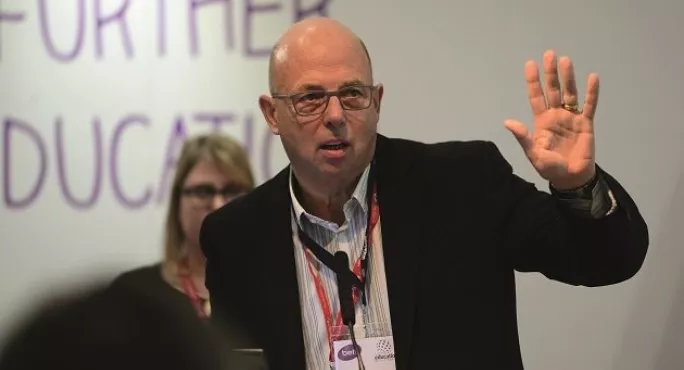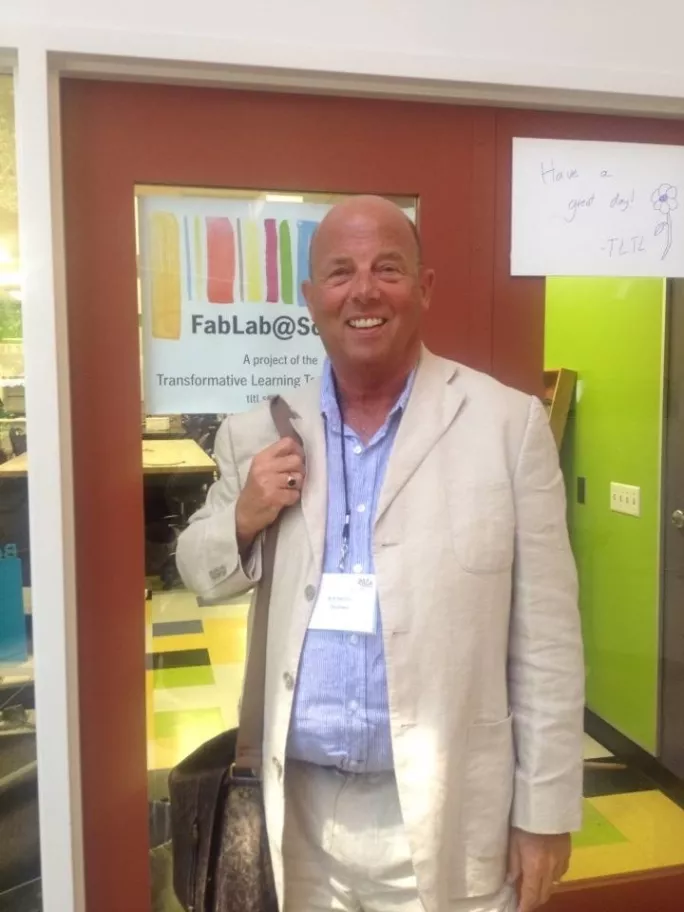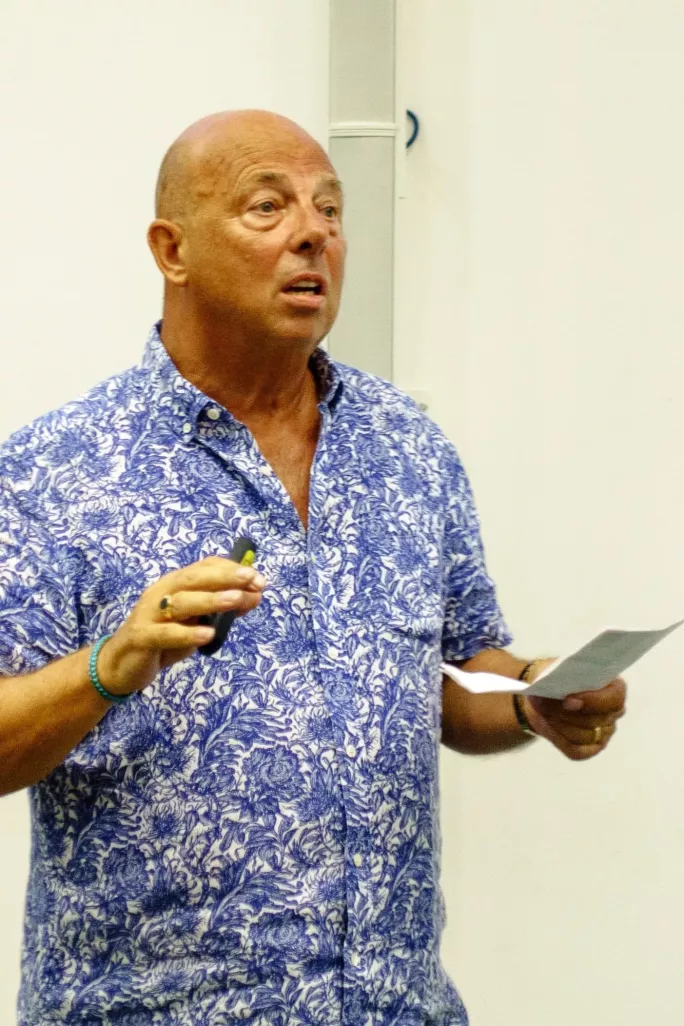Meet Bob Harrison: The online learning pioneer

Anyone who knows Bob Harrison knows he does not hold back, particularly when the topic is something that he is passionate about.
He remembers a time when his presence was requested in then skills minister Matt Hancock’s office. Harrison had written a couple of articles on the lack of vision he believed the government had on the use of technology, and they had gained a lot of traction on Twitter.
“I was sat at home on Sunday night watching Downton Abbey with my wife, and I got a direct message on Twitter, and it was from Matthew Hancock. I’ve still got it. It said, ‘Bob, I’ve read your two articles. I agree with you. Come and see me next week. There’s no money,’” he remembers.
“I went to his office the next day, and we started talking, and he said, ‘I’ve got an hour. That’s all I’ve got, and I want to know what you think I should do.’ I said: ‘OK, you want me to be honest?’ And he said: ‘Yeah, I want you to be honest.’ I have to say I despise his politics with a passion, nationally. But he listened, and things changed.”
As a result of the meeting, as per Harrison’s suggestion, the Further Education Learning Technology Action Group was formed, which went on to be a real trailblazer in making the most of technology in FE.
Now in his 70s, Harrison looks over his CV with pride. It’s a story full of influence, innovation and, crucially, telling the hard truth to those in power. As a result, he has been at the forefront of curriculum development, building leadership standards, and technological innovation. Today, he is the co-chair of Northern College, a governor at Oldham College and a visiting professor at the University of Wolverhampton.
Revealed: How much online learning FE is delivering
By Bob Harrison: Could Covid have created a ‘golden generation’?
Tes FE Awards 2021: Winners revealed
Harrison was born in Rochdale: his father was a labourer in an asbestos factory, and his mum a nurse. His parents had different outlooks on life, which shaped his childhood. His dad had come back from the war and just wanted to be able to put food on the table, and have a peaceful, stress-free life.

His mum, on the other hand, was always striving for more - she had big aspirations for Harrison and his brother, and Harrison says he can remember the disappointment on her face when he didn’t pass his 11-plus.
‘Top dog’ in school and the path towards FE
Going to the comprehensive secondary school didn’t hold Harrison back: in fact, he thrived. As a child, he’d always loved sport, and at secondary school he became captain of the football, basketball and cricket teams, and became head boy in his fifth year.
“If I’d gone to the grammar school, I’d probably have been in the C string and would have felt average or less than average, but by going to secondary modern, I was the top dog,” he laughs.
And although his mum wanted him to become a doctor, there was only one real path for Harrison beyond school: training to become a PE teacher.
He left Rochdale without a second glance - although he has been a passionate supporter of Rochdale FC for 60 years, and goes to the games with his sons and grandsons - and went to train to become a teacher at what was then called Sheffield Teacher Training College.
“It was the time of my life. Can you imagine? I was this young lad from Rochdale, and the world opened up. There were parks, nightclubs, girls, pubs, friends, sport. I had a blissful three years,” he says.
The leap into college education
He met his first wife at university, and after graduation got a job teaching PE at a local catholic secondary school in Sheffield. After about six years, Harrison had become increasingly frustrated with the 13-plus system the school operated, and the social injustice of it. So when a mutual friend pointed out a lecturer job at Stannington College, Harrison took the leap from pre- to post-16 education.
Harrison stayed at Stannington for 11 years, and during his time at the college, his career took a major turn. Harrison was teaching PE and recreation to a range of students on different courses - business students, engineering students - while also coaching the college’s sports teams. He says he didn’t feel in control of his own destiny - and when he came across the Sheffield City Recreation Department, he decided it was time to forge his own path.
He decided to pitch the idea of a course that would prepare students to go and work in sports and recreation facilities, like parks and gardens, to Sheffield City Council. During a meeting with the deputy director of Sheffield city recreation department, the two realised they were both from Rochdale, and a bond was instantly formed. Harrison was charged with creating the courses needed to produce young people ready to work in sports and recreation for councils. In 1982, he approached City and Guilds, which agreed to accredit a pilot of two classes of 15 recruits.
“There was a mix of students from all sorts of backgrounds - but the one thing they had in common was they were motivated by sport and PE and recreation. I didn’t put any qualifications there. You didn’t have to have five O levels or anything. It was about, are you motivated to work in the sporting and recreational environment?,” he says.
“It started off with 30. I had to do the assessments and write the exam questions. Ten years later, it had 17,000 entries, I was the chief examiner for the City and Guilds leisure and recreation course, and I had a team of 15 to 20 assistant examiners.”
It was a busy time for Harrison: he was still teaching at Stannington, had been made the principal lecturer of general communication and leisure studies, and at home he had three young children. Eventually, he decided to leave the recreational courses behind, and pass the baton on to someone else.
Moving into leadership
When Sheffield decided to reorganise its FE colleges, and merge them together to make The Sheffield College, Harrison took the opportunity to move to North Derbyshire College as head of general education, before moving to The People’s College in Nottingham as vice-principal.
Taking the job meant commuting to Nottingham every day from Sheffield, and when he became principal of South Nottingham College in 1992, he moved to a city centre flat, going home at the weekends.
Harrison was principal for around three years - and it was a job that took its toll. “It just wore me down. I thought, ‘I can’t do this any more.’ I had a dream one night - it was more of a nightmare, to be honest, and I saw my epitaph and it said, ‘Bob Harrison, he slowed down the decline of South Nottingham College,’ and I just thought, ‘I don’t want the last 10, 15 years of my career slowing down the decline of anything’,” he says.
“There was a complete mismatch between my ethical values, my moral purpose, what I wanted to do, and the way colleges were being set up to be run as businesses.”
The online learning spark
He took six months to sort himself out: to stop drinking, lose weight and decide what he wanted to do with the rest of his life. He ended up taking a number of freelance roles, including one at the National College of School Leadership as a tutor and assessor, and some work on accreditation for Sheffield Hallam. But there was one role that changed everything, and gave Harrison a new path to tread.
He had stayed in touch with his old boss at Stannington College, Bernard Cooper, and one day Cooper’s son rang Harrison, and asked if he could go to the Sheffield Wednesday football game with him and his sons. The two talked about their careers: Harrison was starting to build a freelance career, and Cooper had been made sales and marketing director for Toshiba Information Systems. They agreed education was a big emerging market for technology - and Cooper invited Harrison to meet the bosses at Toshiba with a view to helping them break into the market.

The conversation resulted in a 17-year-long relationship between Harrison and Toshiba - and sparked a passion for online teaching and learning.
Harrison’s work with Toshiba was what led him to the meeting with Matt Hancock, having previously had a digital lead role on the Labour government’s Building Schools for the Future programme. The network, named the Toshiba Ambassadors, lasted for 15 years, and had a significant impact.
Today, Harrison continues to bang the drum for online learning - and even judges the category for outstanding use of technology in teaching and learning at the Tes FE Awards. Sadly, his mum, who had such high aspirations for him, never lived to see half of what Harrison has achieved.
“If she was still alive, I think she would say, ‘I wanted you to be a doctor,’” he laughs. “But she’d be very proud. When I did my inaugural lecture at the University of Wolverhampton, my opening slide was a picture of my mum in her nurse’s uniform,” he says.
“And I said, ‘I would not be who I am if it wasn’t for this woman.’ I went on to give a 45-minute lecture about education technology, but it was based on the reason why I am what I am, and I believe what I believe because of this woman, and I’m grateful.”
You need a Tes subscription to read this article
Subscribe now to read this article and get other subscriber-only content:
- Unlimited access to all Tes magazine content
- Exclusive subscriber-only stories
- Award-winning email newsletters
Already a subscriber? Log in
You need a subscription to read this article
Subscribe now to read this article and get other subscriber-only content, including:
- Unlimited access to all Tes magazine content
- Exclusive subscriber-only stories
- Award-winning email newsletters